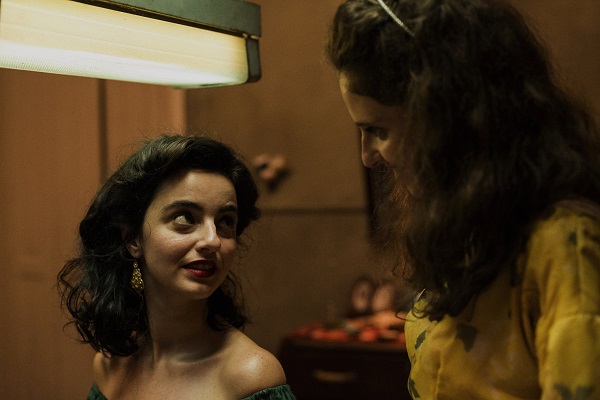
Two sisters grow apart, while two strangers know each other without ever meeting. These are the kind of stories that festival goers experience when they go to Cannes. Every year, new critics get to have that experience. This year is not my year, at at this point, it will take a long time for me to even have the courage to apply, but it seems like the universe is being nice to me when MUBI announced that they will be playing a few eclectic films that played that festival over the decades. Of course, MUBI already has many films that played at Cannes, but they’re bringing more!
A little history lesson – Cannes existed because its founders wanted a festival that worked as an alternative to Venice. Cannes existed as a protest against Venice’s toleration of fascism. I am not getting into whether or not Cannes is fulfilling that ethos. Although as I go through these films one by one, the films that MUBI chose are less political and thankfully, more personal and social. This is a retrospective piece on the Cannes films that MUBI are showing that I already saw before, and at this point I can’t work fast enough to make a big piece on the films that are new to me so I’m writing a piece on each. But from the way it’s looking, these discoveries do deserve their own spotlights.
The first of these new additions is Karin Ainouz’ The Invisible Life of Euridice Gusmao, and MUBi is advertising this film with its full title instead its shorter title Insivisble Life. I reviewed it when it came out during TIFF in 2019, when I zeroed in on the class differences between the two sisters (Carol Duarte and Julia Stockler) who separate and never meet. There’s the obvious Greek mythology reference that, as with many myths, have Freudian meanings when modern directors adapt them. This is probably the best film in the series and I’m happy that MUBI acquired it.
A housewife, Ila (Nimraut Kaur), finds an unlikely friend, Saajan (Irffan Khan) when the titular lunchbox in… Ritesh Batra’s The Lunchbox ends up on the latter’s table instead of her husband’s. What begins is an epistolary friendship that may lead to more. It’s a great film even if I totally misremember it. I remembered them both writing to each other in English or that the dialogue was in English, but there’s actually more Hindi dialogue than I remembered, as Ila learns English both through him and through his auntie. It uses a lot of familiar cinematic language. We know when Ila doe sher husband’s laundry that she’s going to smell something she doesn’t expect. But Kaur’s performance adds nuance to an otherwise archteypal character.
The characters in The Killing of a Sacred Deer are, at least in repeat viewings, less archetypal. The twisted mind – ugh – of former baller and current director Yorgos Lanthimos brgins us a couple. They are Steven Murphy (Colin Farrell), a doctor, and his housewife Anne (Nicole Kidman). A speghetti eating youth, Martin Lang (Barry Keoghan) enters their lives. And in doing so, he avenges the death of his father that he believes Steven is responsible for. The rewatch reveals the kind of normalcy that the couple try to maintain in public. Lanthimos’ stilted dialogue make the veneer of the nuclear family much more disturbing. This is also the second film in this retrospective that, to my knowledge, references Greek mythology.
Greek mythology isn’t the original text that Djibril Diop Mambéty adapts in his film Hyenas, but its scale is just as grand. He instead adapts German writer Friedrich Durrenmatt’s obscure play The Visit, but obviously changing the characters to African ones. Here, a man, Dramaan Drameh (Mansour Diouf) begs for his life. He needs to do this after his former lover Linguere Ramatou (Ami Diakhate) puts a bounty on his head. The bounty seems like it’s worth it though, as she showers their town with her new wealth, including appliances that the townsfolk go crazy for. The social aspect of Cannes’ shows through films like this. Especially, in this one that sees the power dynamic between Dramaan and Linguere.
Again, I’m not going to talk about where Cannes fails, but at least they give voices to places outside of what we consider the West. MUBI, in turn, choose cinema from places like Senegal to North Ossetia. The latter is the setting for Kira Kovalenko’s Unclenching the Fists, about Ada (Milana Aguzarova). She’s a local woman living in an abusive household. I gave the depiction of that abuse the benefit fo the doubt in my review during that year’s TIFF. This is still true even if Kovalenko’s approach to the subject matter feels maximalist. She tells the story of a woman who is starting to see slivers of the same freedom as the people she represents. In doing so, she gives us what comes off as a work with an original voice.
Cannes takeover on MUBI began yesterday as they put Inivisible Life on their platform, starting a slow rollout where their subscribers can rediscover these films one at a time.
- Rated: NR, PG, R
- Genre: Comedy, Drama, Romance, Thriller
- Directed by: Djibril Diop Mambéty, Karim Ainouz, Kira Kovalenko, Ritesh Batra, Yorgos Lanthimos
- Starring: Carol Duarte, Colin Farrell, Irrfan Khan, Mansour Diouf, Milana Aguzarova
- Produced by: Ed Guiney, Michael Weber, Rod Stoneman, Sergey Melkumov, Sunil John
- Written by: Anton Yarush, Djibril Diop Mambéty, Efthymis Filippou, Karim Aïnouz, Ritesh Batra
- Studio: AR Content, CNC, Limp Films, Maag Daan, RT Features


